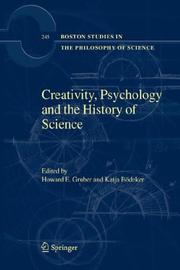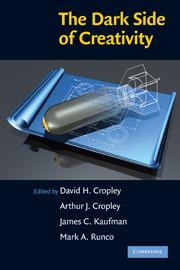(redirected from ReadingNotes.Gruber)
Creativity, Psychology and the History of Science edited by Howard Gruber and Katja Bödeker - ISBN 1402034911 - Boston Studies in the Philosophy of Science Vol. 245, Springer 2005
Motivation
Recommended by Cindy.
Pre-reading model
Draw a schema (using PmGraphViz or another solution) of the situation of the area in the studied domain before having read the book.
Reading
Introduction by Katja Bödeker
- "This book offers a comprehensive survey of Gruber’s work and focuses on the heritage he left behind for building a historical theory of the development of human knowledge in which individual creativity can be understood within its changing historical contexts." (p.vii)
- "disciplinary variety testifies that growth of knowledge transcends the confines of a single discipline." (p1)
- " [Gruber’s approach] on creative work
- will be contrasted with two psychological approaches to creativity:
- the psychometric approach and
- the creative cognition approach.
- Secondly, it will be pointed out how Gruber’s work can contribute to our understanding of the growth of knowledge." (p2)
- "The main purpose of the creative cognition approach is to analyze the structural underpinnings of creative thought processes." (p5)
- "The focus of the case study is on the creative individual and his development rather than on basic components of short-time cognitive processes or on general indicators of creativity." (p6)
- "The case study method is backed by the so-called <<evolving systems approach>> which conceives of the person as a system of loosely coupled subsystems—knowledge, purpose and affect." (p6)
- "Taking creation as the outgrowth of purposeful activity is to be contrasted to the romantic view of the creator as a vessel passively receiving his earth-shaking ideas either from God, the Weltgeist or from the arcane murmuring of his subconscious." (p7)
- "Timespans of months or even years [for thought processes] definitely transcend the limits of cognitive experimental research." (p9)
- "Highlighting the individual rather than the universal, Gruber’s case study approach diverges from the perspective taken by Piaget." (p10)
- "The uniqueness of creative individuals, however, is not a mere fact. It may represent a developmental norm the creative person aims at." (p12)
- "In his analysis of the growth of Darwin’s theory of evolution, [Gruber] shows that the idea of natural selection occurs in Darwin’s notebooks before the celebrated <<Malthusian insight>> took place." (p13)
- mentions of Thomas Kuhn's paradigms and to Lakatos' research programs pages 13 and 14
- see also related ReadingNotes
- "Sticking to the central ideas of their intuitive theories, the children —at least for a certain time— resist counter-evidence." (p14)
Introduction by Howard Gruber
- "The most distinctive feature of the evolving systems approach is our emphasis on the idea that creative work is purposeful and that it takes time because it is in principle difficult, and almost always follows a meaningful but non-linear course." (p22)
- "When a goal is attained, the enterprise is likely to engender novel tasks and projects that continue it. The creative individual does not pursue only a single enterprise, but orchestrates and coordinates several, thereby constructing the network of enterprise." (p22)
- "I hope that this arrangement permits us to see one network of enterprise as a whole, while preserving the elements that compose it." (p26)
- which is hard to see since the reader isn't involved in a creative process while reading the book
- "One of the main results of our studies is an appreciation of how much time it takes to do creative work and an understanding of the requirements that it brings with it." (p27)
- something that note taking, with a paper notebook or other modern techniques, probably helps
- "The network of enterprise and the sense of purpose provide the individual with a regulatory system to remain on the pathway to productive achievement." (p27)
See also
Overall remarks and questions
Synthesis
So in the end, it was about X and was based on Y.
Critics
Point A, B and C are debatable because of e, f and j.
Vocabulary
(:new_vocabulary_start:)
new_word
(:new_vocabulary_end:)
Post-reading model
Draw a schema (using PmGraphViz or another solution) of the situation of the area in the studied domain after having read the book. Link it to the pre-reading model and align the two to help easy comparison.
Categories
Back to the Menu
Other read books linking to the CreativityPsychologyAndTheHistoryOfScience page :
Back to the Menu
 Fabien Benetou's PIM
Fabien Benetou's PIM








